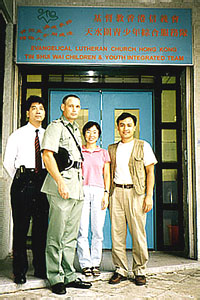



















 Youth enhancement scheme's main operatives: S/Sgt of YL DIST, D A Whyte, Cheng Wai-hing and Lau Chung |
RECOGNISING the increasing incidence of students being involved in juvenile crime, Tin Shui Wai Police Division under the leadership of then-DVC Bute Wing-kim, SP, began a Youth Enhancement Scheme last January targeting students of four selected schools in the Division who had been arrested for criminal offences and been dealt with under the Superintendents' Discretion Scheme. ¡@The strategy, further developed by the current DVC, David Whyte, SP, involved police co-ordinating an individual programme of counselling, supervision and self-discipline training provided by the respective school's reps and social workers from the local branch of the Evangelical Church of Hong Kong Social Service Centre. ¡@Such has been the success of the project that of the 35 students taken on board during the initial six-month trial period not one has re-offended. The scheme has been very well received by the students themselves, their parents and community organisations. | ||
|
¡@Initial reluctance on the part of some schools to join the scheme for fear of being labelled as a problem school faded after the success of the trial period. ¡@Following requests by individual schools and an evaluation of the pilot scheme, the project has been extended to encompass all secondary schools within the Tin Shui Wai Police Divisional boundaries with effect from the September school term. Consideration is also being given by other police divisions to adopting the scheme. ¡@The project ensures that whenever a student of one of the targeted premises is arrested for a criminal offence a background report is obtained from the school with the consent of the student's parents or guardians. ¡@Where action by way of Superintendents' Discretion is appropriate, immediately following the admonishment an initial case conference is convened involving the student, parents, school discipline master, social worker and the school liaison officer from the District's Police Community Relations Office. ¡@At this conference the cause of the student's offence is investigated and any immediate social, moral or safety aspects attended to. Then a programme is tailored for the student involving house visits, family conferences, peer counselling, monitoring and supervision. This programme, administrated by the social service centre and the respective school lasts for approximately six months, depending on the subject's circumstances and response. ¡@Through the guidance of professional social workers, the programme is designed to assist students to overcome the personal problems that led to their offending and to develop their self-esteem, sense of identity and interpersonal skills in order to achieve a high standard of self-discipline. Self-confidence is also encouraged through participation in adventure leadership and military-style training regimes. At the same time, individual counselling of both student and parent strengthens a positive and communicative relationship between the young person and the family, while at the same time reducing negative peer pressure from undesirable acquaintances. ¡@Whenever it is considered that something more is required to jog students into appreciating the limited future which is presented if they fail to take control of their own lives, participating police step in to dispel any notion that crime is an attractive or sustainable life style. ¡@In this respect it has been very beneficial for the student to be taken on a visit to Pik Uk Correctional Institute to emphasise what lies ahead for them if they do not put their own life into check. ¡@Participation in the scheme is entirely voluntary by both students and parents. To date there has been no incidence of either refusing. On the contrary, gratitude has been extended that someone has taken the time to assist the families involved. ¡@The shock of the arrest and SP's Discretion has been the catalyst needed to address the problems. ¡@A survey of graduates from the programme after the initial six-month pilot scheme revealed that virtually all were convinced that their life had improved following the intervention of police and social workers. Most recognised that their knowledge of the law, and determination not to break it again, had been enhanced. Over half reported that the relationship with their families had improved, while a third said the programme had led to better concentration at school. ¡@The participating schools reported that the students had made a remarkable improvement in their class performance, particularly in their attitude toward learning and in handling relationships with students and teachers. | |||
|
¡@Vast improvement was noted in those who took part in adventure and leadership camps with all feeling remorse for their previous lifestyle and offending, while developing a determination to reform themselves. Two such students went on to secure school awards. ¡@A conference attended by representatives of all secondary schools in Tin Shui Wai Division held prior to the new school term revealed overwhelming appreciation and support for the continuation and expansion of the scheme with extensive feedback for further enhancement aimed at securing a positive future for the community's youth. ¡@Other formations who would like to consider the scheme for possible adoption may contact DVC TSW to receive an information pack. |
 Adventure training and leadership activities help build students' self-confidence, esteem and ability to work with others, while reducing aggression, frustration and violent tendencies | ||
you look at it | |
 Carol Ting Ling uses the computerised Braille display to get her work done |
CAROL TING LING, executive officer of the Hong Kong Police Force's Personnel Information Communication System (PICS), was last month given the Labour Department's Outstanding Disabled Employee Award for 1997. ¡@ Although Carol was born visually disabled, her inability to see has not hindered her determination to be independent nor her desire to learn. She is the first blind female graduate of the University of Hong Kong, as well as the first visually disabled woman executive officer of the Government. |
|
¡@ "My parents are university graduates who understand the importance of education. They required their children to learn to be independent and develop themselves through study and learning. Despite my visual handicap, they have the same expectations of me as my younger brother, who has no disabilities," said Ms Ting. ¡@ Carol attained her Middle Three at the Ebenezer School for the Blind, continuing her secondary education at the eminent St Steven's Girls' College before entering the Department of Social Work and Public Administration at HKU. ¡@ "Like other visually disabled students, I spent one whole year learning how to read Braille," Carol recalls. "It was difficult studying at St Stephen's because it's an English secondary whereas the teaching language of my previous school is Chinese. But my classmates helped a lot by reading me the data on the board or lending me their notes. I then went back to the Ebenezer School where its resource teachers helped me to translate the notes into the Braille." ¡@ At university Carol made use of available technology to scan hard copies of course material into a computer which she then translated into Braille employing special software. With the assistance of the computerised Braille Display, she can read every piece of information in the computer file. ¡@ "Often, after class when other students went out for entertainment - I had to keep on studying so as not to fall behind," shrugs Carol, whose study time doubled as she scanned data into the computer, translated it into Braille, and transcribed notes from her tape recorder. "It was a kind of sacrifice, but what I was able to achieve is reward enough." ¡@ When she graduated from HKU, although no one in her class attained the First Honours, Carol attained the best result of the Second A. ¡@ "I always encourage visually disabled students - especially females -- to finish university education," says Ms Ting, who spends much time as a volunteer counsellor with the Hong Kong Blind Union. ¡@ "Visually impaired individuals need to have more contact with society. We should voice out our problems and contribute our power to helping other people. The reality is that those with handicaps have to try harder to achieve what people without disabilities take for granted. We need to make the extra effort. But it's worth it." ¡@ As executive officer of the Hong Kong Police Force's Personnel Wing, Carol Ting Ling deals with all of the office work her post throws her way. That includes everything from supervising the work of civilian staff, to handling enquiries on personnel matters. ¡@ "Carol performs very well and works extremely hard," says Guy Lown, CIP PICS MP. "She is a very determined lady. Despite her disability, she's not afraid to approach me or any of her colleagues when she needs some assistance -- though that rarely happens." ¡@ Nominated for the Outstanding Disabled Employees Award this year were 92 people across the territory competing for twelve awards. ¡@ "Carol has earned her award ten times over," said CIP Lown. "No doubt about it." | |

![]()
